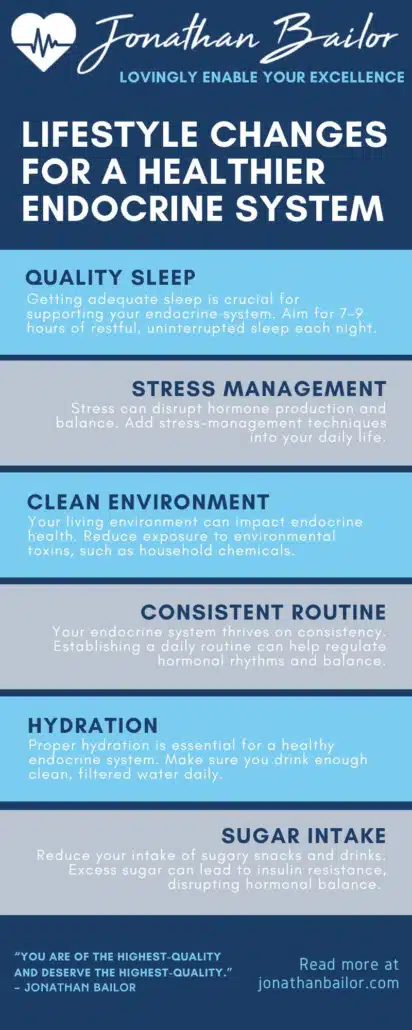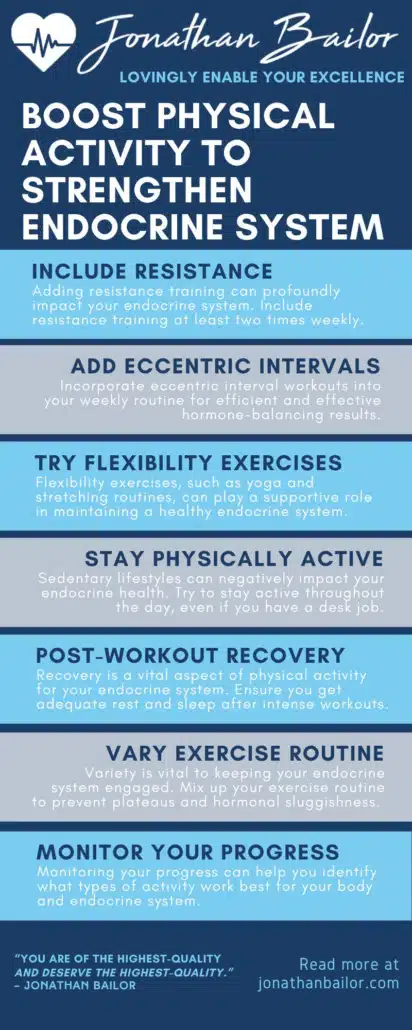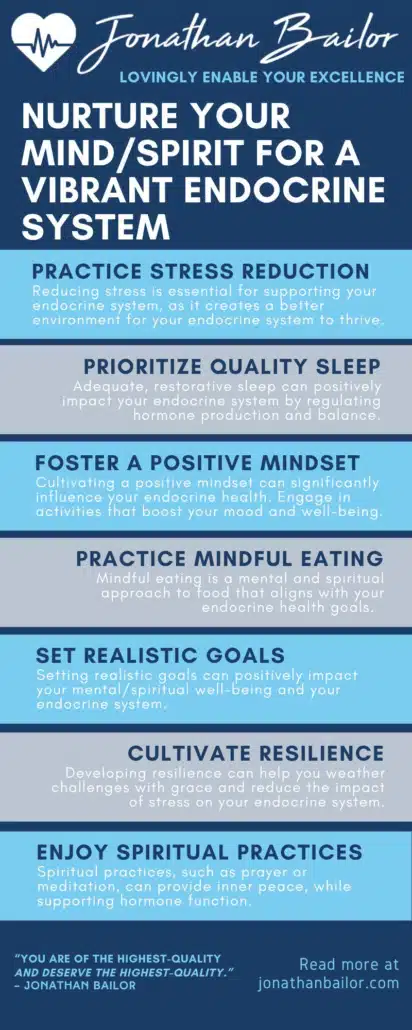26 Lifestyle Changes for a Thriving Endocrine System
Are you ready to take control of your health and unlock your body’s full potential? If you’re like many others, you may have been struggling with various health issues and wondering how to improve your overall well-being. Well, you’re in the right place!
Today, we’re diving into the fascinating world of the endocrine system—a complex network of glands and hormones that play a pivotal role in your health. Whether in your 20s, 50s, or beyond, nurturing your endocrine system is essential for maintaining vitality and longevity.
This isn’t a hormone health lecture filled with medical jargon or complex theories. Instead, we’re here with Jonathan Bailor to explore 27 lifestyle changes that can breathe new life into your endocrine system. These are simple, actionable steps anyone can follow, regardless of age or background. Our mission is to make health accessible to all.
Our journey will uncover the incredible impact of hormones on your body and how seemingly small adjustments in your lifestyle can lead to profound improvements in your health.
From nutrition to exercise, stress management to sleep, we’ll guide you through the terrain of health and wellness. Together, we’ll uncover practical, real-world solutions to help you thrive.
But we’re not stopping there. Our ultimate goal is to inspire you to share this knowledge with your loved ones. We want you to feel empowered to pass on the gift of health, knowing that the wisdom you gain here can make a difference in the lives of those you care about.
So, are you ready to embark on this journey of discovery, armed with the knowledge to boost your endocrine system and enhance your overall well-being? Join us as we explore these 26 transformative lifestyle changes that could shape a healthier, happier future. Together, we’ll unlock the door to a life filled with vitality, energy, and wellness.
If you love this type of content then make sure to check out our The BEST Trendsetting Weight Loss Plan for a New and Improved You and 26 Lifestyle Tweaks for a Vibrant Endocrine System: Timetable for Change guides!
Transform Your Lifestyle for a Healthier Hormones and Endocrine System
1. Prioritize Quality Sleep for Endocrine Glands
Getting adequate sleep is crucial for maintaining good health and supporting your endocrine system. It is recommended to aim for 7-9 hours of restful, uninterrupted sleep each night. Create a comfortable sleep environment, free from distractions like screens and excessive noise. Consistency matters, so establish a regular sleep schedule to sync with your body’s natural rhythms. Quality sleep helps regulate hormone production, supporting your endocrine system in maintaining balance and overall well-being.
2. Manage Stress Mindfully
Stress can severely disrupt your endocrine system, negatively affecting production and balance. Incorporate stress-management techniques into your daily life. Explore mindfulness practices like deep breathing, meditation, or yoga. These practices help reduce the cortisol levels associated with stress, allowing your endocrine glands to function optimally. Remember, it’s not about eliminating stress entirely but about managing it effectively to support your overall health.
3. Optimize Your Environment
Your living environment can significantly impact your endocrine health. Minimize exposure to environmental toxins, such as household chemicals, plastics, and pollutants. Choose natural cleaning products, reduce plastic use, and consider using air purifiers, if needed. These steps can help reduce the burden on your endocrine system, allowing it to operate without unnecessary disruptions.
4. Maintain a Consistent Routine
Your endocrine system thrives on consistency. Establishing a daily routine can help regulate hormonal rhythms. Aim to wake up and go to bed at the same time each day. Regular meal times also contribute to hormonal balance. Consistency in your daily activities and habits, such as regular physical activity (outside of this context), can support your endocrine system’s health and function.
5. Stay Hydrated with Clean Water
Proper hydration is essential for a healthy endocrine system. Make sure you drink enough clean, filtered water daily. Avoid excessive consumption of sugary beverages and limit your intake of caffeinated drinks. Staying adequately hydrated supports the efficient transport of hormones throughout your body, aiding in their proper function and regulation.
6. Minimize Excess Sugar Intake
While we’re not discussing diet specifically, it’s important to touch on the impact of excess sugar consumption on your endocrine system. Reduce your intake of sugary snacks and drinks. Excess sugar can lead to insulin resistance, disrupting the delicate balance of your endocrine system. Opt for whole foods and natural sweeteners like honey or maple syrup in moderation.
By incorporating these lifestyle changes into your daily routine, you can take significant steps toward supporting a healthier endocrine system. Remember, it’s the small, consistent efforts that can lead to lasting improvements in your overall well-being.

Feeling Better Is Priceless, That's Why We Don't Put A Price On It!
“It’s Like A Free and Medically Valid Version of Noom and Weight Watchers Online”
~ Dr. Doctor Matthew Oleshiak, MD
Click the 'LEARN MORE' button below for free lifetime access to the fast fix program developed by Jonathan and top Ivy League Medical Doctors
LEARN MOREP.S. It's not a free trial. It's not part of the program for free. The entire program is free, forever, for real! No credit card needed.
Revamp Your Diet for a Robust Endocrine System
1. Embrace Balanced Macronutrients
Balancing macronutrients is critical to supporting your endocrine system. Incorporate a mix of carbohydrates, proteins, and fats into your diet. Opt for complex carbohydrates like nonstarchy vegetables, which provide a steady energy source and help stabilize blood sugar levels. Include lean proteins such as poultry, fish, or plant-based sources like legumes. Healthy fats like avocados, nuts, and olive oil are essential for regulating hormone production.
2. Choose Fiber-Rich Foods
Fiber is your endocrine system’s ally. Aim to include plenty of fiber-rich foods in your diet, such as low-sugar fruits and nonstarchy veggies. Fiber helps maintain steady blood sugar levels and promotes efficient digestion, which indirectly supports hormonal balance. Start your day with a high-fiber breakfast to kickstart your metabolism and maintain energy levels throughout the day.
3. Limit Processed Foods
Processed foods are often packed with added sugars, unhealthy fats, and artificial additives that can disrupt your endocrine system. Reduce your consumption of processed snacks, sugary drinks, and fast food. Instead, focus on whole, unprocessed foods. Cooking meals at home with fresh ingredients allows you to have more control over what goes into your body and promotes hormonal balance.
4. Opt for Nutrient-Dense Snacks
Snacking can be a part of a healthy diet when done right. Choose nutrient-dense snacks like fresh fruit, Greek yogurt, or a handful of nuts. These options provide essential vitamins, minerals, and healthy fats that support your endocrine system. Avoid sugary and empty-calorie snacks that can cause blood sugar spikes and crashes.
5. Include Omega-3 Fatty Acids
Omega-3 fatty acids, found in fatty fish like salmon, walnuts, and flaxseeds, are essential for hormonal health. These healthy fats play a role in reducing inflammation and supporting hormone production. Aim to include sources of omega-3s in your diet regularly to maintain a healthy endocrine system.
6. Stay Hydrated with Herbal Teas
Hydration is vital for overall health, including your endocrine system. Replace sugary or caffeinated beverages with herbal teas. Herbal teas, such as chamomile or ginger, can provide hydration without added sugars or caffeine. Staying adequately hydrated helps transport hormones throughout your body, aiding in their proper function and regulation.
By making these diet changes, you can take significant steps toward supporting a healthier endocrine system. Remember, your dietary choices directly impact your hormones, and these adjustments can contribute to your overall well-being.

Elevate Your Physical Activity for a Thriving Hormonal and Endocrine System
1. Incorporate Resistance Training
Adding resistance training to your routine can profoundly impact your endocrine system. Engaging in activities like weightlifting or bodyweight exercises helps build lean muscle mass. Muscle tissue is metabolically active, which means it can aid in regulating blood sugar levels and improving insulin sensitivity. Aim to include resistance training at least two to three times weekly for noticeable benefits.
2. Prioritize Eccentric Interval Training
Eccentric interval training, an innovative twist on traditional high-intensity interval training (HIIT), melds the intensity of HIIT with the profound benefits of eccentric exercise — where the focus is on the muscle-extending phase of each movement. It involves bursts of high-energy action, where every lowering motion is deliberate and intensified, followed by periods of rest or lower-intensity activity. This method not only fuels your body’s endocrine health, enhancing insulin sensitivity and ramping up human growth hormone (HGH) production, but also deepens the impact on muscular strength and endurance, contributing to hormonal balance. Incorporate eccentric interval workouts into your weekly routine for efficient and effective results.
3. Explore Flexibility Exercises
Flexibility exercises, such as yoga and stretching routines, can play a supportive role in maintaining a healthy endocrine system. These activities help reduce stress and promote relaxation, indirectly supporting hormonal balance. They also improve circulation and stimulate the release of feel-good hormones like endorphins. Aim to include regular flexibility sessions to complement your overall fitness regimen.
4. Stay Active Throughout the Day
Sedentary lifestyles can negatively impact your endocrine health. Try to stay active throughout the day, even if you have a desk job. Take short breaks to stretch or walk, use a standing desk, or incorporate brief bouts of physical activity into your routine. These small changes can help prevent prolonged periods of inactivity that may disrupt your hormonal balance.
5. Prioritize Post-Workout Recovery
Recovery is an often overlooked but vital aspect of physical activity for your endocrine system. Ensure you get adequate rest and sleep after intense workouts. This downtime allows your body to repair and regenerate, supporting healthy hormone production. Proper hydration and nutrition also play a role in post-workout recovery, so make sure you nourish your body after exercise.
6. Vary Your Exercise Routine
Variety is vital to keeping your endocrine system engaged and responsive. Mix up your exercise routine to prevent plateaus and stimulate different hormonal responses. Try other forms of cardio, strength training, and flexibility exercises. The diversity in your workouts can help maintain hormonal balance and prevent adaptation to a single type of activity.
7. Monitor Your Progress
Regularly track your physical activity and its effects on your overall well-being. Keep a journal of your workouts, noting how you feel both during and after exercise. Monitoring your progress can help you identify what types of activity work best for your body and endocrine system. Adjust your routine as needed to continue reaping the benefits of a healthy endocrine system.
You can actively support a healthier endocrine system by making these activity and exercise changes. Physical activity is a potent tool for regulating hormones and enhancing overall health. Incorporate these strategies into your routine to unlock the full potential of your endocrine system.

Nurture Your Mind and Spirit for a Vibrant Endocrine System and Hormonal Balance
1. Practice Stress Reduction Techniques
Reducing stress is essential for supporting your endocrine system. Use stress reduction techniques like deep breathing, meditation, or progressive muscle relaxation. These practices can lower cortisol levels, preventing hormonal imbalances. By managing stress effectively, you’ll create a more harmonious environment for your endocrine system to thrive.
2. Prioritize Quality Sleep
Quality sleep not only benefits your body but also nurtures your mind and spirit. Develop a relaxing bedtime routine to improve sleep quality. Consider practices like reading, gentle stretching, or journaling before bed to unwind mentally and emotionally. Adequate, restorative sleep can positively impact your endocrine system by regulating hormone production and balance.
3. Foster a Positive Mindset
Cultivating a positive mindset can significantly influence your endocrine health. Engage in activities that boost your mood and sense of well-being. Spend time with loved ones, pursue hobbies you’re passionate about, and practice gratitude. Positivity can help reduce stress hormones and support overall hormonal balance.
4. Practice Mindful Eating
Mindful eating is a mental and spiritual approach to food that aligns with your endocrine health goals. Pay attention to your body’s hunger and fullness cues, and savor each bite. Eat with intention, focusing on nourishing your body rather than mindless consumption. This mindful approach can help regulate your appetite hormones and foster a healthier relationship with food.
5. Set Realistic Goals
Setting realistic goals for personal growth and achievement can positively impact your mental and spiritual well-being. Break larger goals into smaller, manageable steps to avoid feeling overwhelmed. Achieving these goals can boost your self-esteem and reduce stress, which benefits your endocrine system. Remember that progress, not perfection, is the key to sustainable growth.
6. Cultivate Resilience
Life is full of challenges, but developing resilience can help you weather them with grace. Resilience involves adapting to adversity and rebounding from setbacks. Cultivate resilience by seeking support from friends and family, practicing self-compassion, and maintaining a problem-solving mindset. Building resilience can reduce the impact of stress on your endocrine system.
7. Engage in Spiritual Practices
Spiritual practices, such as prayer, meditation, or connecting with nature, can provide a sense of purpose and inner peace. These practices can lower stress levels and positively influence your endocrine system. Find a spiritual practice that resonates with you and incorporate it into your daily life to support your mental and spiritual well-being.
Making these mental and spiritual changes can create a holistic approach to supporting your endocrine system. Nurturing your mind and spirit is just as crucial as diet and physical activity for maintaining hormonal balance and overall well-being. Incorporate these practices into your life to unlock the full potential of your endocrine system.

Hormone Health FAQ: Your Questions Answered
Q1: What Are Hormones, and Why Are They Important for Health?
A1: Hormones are the body’s chemical messengers, produced by various glands and tissues in the body. They regulate various physiological processes, including metabolism, growth and development, mood, and reproduction. (Correctly formed and functioning reproductive organs are essential for the continuation of the human species.) Hormones help maintain balance within the body, ensuring that critical functions are carried out correctly. Their influence extends to almost every aspect of health, from maintaining energy levels to supporting emotional well-being.
Q2: How Can I Maintain Healthy Hormone Levels?
A2: Maintaining healthy hormone levels is essential for overall well-being. Start by adopting a balanced lifestyle that includes a nutrient-rich diet, regular physical activity, and adequate sleep. A diet rich in whole foods, including lean proteins, complex carbohydrates, and healthy fats, can support hormone production and regulation. Regular exercise helps improve insulin sensitivity and reduce stress, which can impact hormone balance. Quality sleep is crucial because hormone production and regulation occur during deep sleep cycles. Minimize stress through relaxation techniques like meditation, deep breathing, or mindfulness practices, as chronic stress can disrupt hormone levels.
Q3: What Are Some Common Hormone-Related Health Issues, and How Can They Be Prevented?
A3: Common hormone-related health issues include thyroid disorders, diabetes due to impaired glucose metabolism, high blood pressure, issues with reproductive hormones, and hormonal imbalances such as polycystic ovary syndrome (PCOS) or testosterone deficiencies. Prevention often involves a combination of lifestyle choices and early detection. Maintaining a balanced diet, regular exercise routine, and managing stress can help prevent or manage these issues. Routine screenings and check-ups can detect hormonal imbalances or disorders early, providing timely intervention and management. For specific conditions like diabetes, managing blood sugar levels through diet, medication, and regular monitoring is crucial.
Q4: Can Hormones Impact Mental and Emotional Well-Being?
A4: Yes, hormones can significantly impact mental and emotional well-being. Fluctuations in hormone levels, such as those that occur during the menstrual cycle or menopause, can lead to mood swings, anxiety, or depression in some individuals. Hormonal imbalances, like those seen in a dysfunction of thyroid hormones or the adrenal glands, can also affect mood and energy levels. The thyroid hormone regulates many bodily systems, such as body temperature and heart rate. Additionally, hormone-related conditions like PCOS or low testosterone can contribute to emotional and mental health challenges. Addressing hormonal imbalances through medical treatment, lifestyle changes, or therapy can often improve mental and emotional well-being.
Q5: Are There Warning Signs of Hormone-Related Health Issues?
A5: Yes, there are warning signs of hormone-related health issues that you should be aware of. These signs can vary depending on the specific hormonal imbalance or disorder but may include unexplained weight changes, changes in skin and hair texture, fatigue, irregular menstrual cycles, excessive thirst or urination, mood swings, or changes in libido. If you experience persistent or concerning symptoms related to hormonal health, it’s crucial to seek medical advice. Healthcare professionals can perform hormone tests and assessments to determine the underlying cause of these symptoms and recommend appropriate treatment or management strategies. Early intervention is often crucial to addressing hormone-related health issues effectively.
Q6: What Types of Hormones Are There?
A6: There are numerous hormones, including the following:
- Sex hormones
- Pineal gland hormone
- Steroid hormones
- Adrenal glands
- Thyroid hormones (secreted by the thyroid gland)
- Reproductive hormones (estrogen, progesterone, testosterone, and follicle-stimulating hormone)
- Parathyroid glands hormone
- Growth hormone (secreted by the pituitary gland)
Empower Your Health Journey
In your quest for holistic well-being, remember that nurturing your endocrine system is a powerful step towards vitality and longevity. You can unlock the full potential of your health through simple lifestyle changes, diet adjustments, mindful physical activity, and mental and spiritual practices.
Your hormones are crucial in this journey, impacting every facet of your life. Now armed with knowledge and practical steps, it’s time to share this wisdom with your loved ones. Empower them to join you on the path to optimal health. Together, let’s celebrate vibrant living and inspire one another to thrive.
Share this invaluable resource with your friends and family on social media and via email, and let’s spread the gift of well-being far and wide.
Feeling Better Is Priceless, That's Why We Don't Put A Price On It!
“It’s Like A Free and Medically Valid Version of Noom and Weight Watchers Online”
~ Dr. Doctor Matthew Oleshiak, MD
Click the 'LEARN MORE' button below for free lifetime access to the fast fix program developed by Jonathan and top Ivy League Medical Doctors
LEARN MOREP.S. It's not a free trial. It's not part of the program for free. The entire program is free, forever, for real! No credit card needed.




